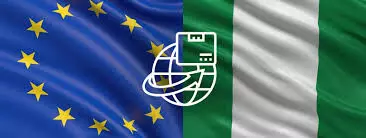- Home
- /
- Features/Spotlight
- /
- Examining Nigeria-EU...

The European Union is an organization that seeks to promote the interests of European countries that subscribe to it. It strives to promote, among other things, the political, economic, and migration integration of member countries.
It maintains diplomatic relations with many countries around the world, including Nigeria, with a view to advancing member countries` as well as bloc interests.
“The European Union (EU) is a supranational, intergovernmental decision-making institution established to foster deep economic cooperation and political integration between European countries.
“Nigeria’s relations with the EU date to the 1970s, when it led a group of 46 African, Caribbean, and Pacific states (ACP) during the negotiations between the European Economic Community (EEC) (now the EU).
“The dialogue culminated in the formation of the ACP-EEC Lomé Convention on February 28, 1975, in Lomé, Togo“, says Olukayode Bakare, an international relations expert, in a study published by the Open Journal of Social Sciences.
As major players in international politics and economy, the EU and Nigeria have fostered a partnership that has been mutually beneficial over the decades.
“The EU remains Nigeria’s biggest trading partner, first investor, top donor of humanitarian and development aid, and biggest diplomatic network. The volume of EU-Nigeria trade stood at €28.7 billion in 2021, a 25.8 percent increase over that of 2020.
“The EU’s imports from Nigeria stood at €17.5bn, while its exports were valued at €11.2bn, with the trade balance at €6.4bn in favor of Nigeria.
“The EU is Nigeria’s most important trading partner, accounting for 20.9 percent of Nigeria’s trade with the world. The EU is the first export destination for Nigeria, accounting for 25.4 percent of its exports.
The EU is second in Nigeria’s imports from the world, accounting for 16.1 percent of its total imports. Nigeria’s economic relations with the EU bloc of 27 Member States," the EU said in a recent report.
Under President Muhammdu Buari’s eight-year reign, the diplomatic relationship between the two seems to have blossomed.
In a recent press statement, the EU said it will provide funding to the tune of 508 million euros between 2021 and 2024 to Nigeria.
According to the EU, the money would be expended on projects that strengthen its bilateral cooperation with Nigeria.
The Multiannual Indicative Programme (MIP) would be built around three priority areas: peace and migration, human development, the green and digital economy, and good governance.
“The European Union has a long-standing partnership with Nigeria.
“We are glad to launch this multiannual program during the visit of the Executive Vice President of the European Commission, Ms. Margrethe Vestager, and on the eve of the 6th EU-African Union Summit in Brussels,” said Samuela Isopi, EU Ambassador to Nigeria and ECOWAS, in a statement.
Similarly, earlier this year, the European Union Delegation to Nigeria stated its commitment to finance three projects in the value of 98 million Euros (approximately N20 billion)
The projects are in the justice, anti-corruption, and drug sectors in Nigeria. These projects are expected to be implemented by the United Nations Office on Drugs (UNODC).
Already, the EU and Nigeria are working out arrangements on a multi-billion naira project that would massively benefit both parties: the supply of gas to EU-member states in the face of disruption in supplies by Russia as a result of the Russia-Ukraine conflict.
The News Agency of Nigeria (NAN) reports that the EU’s executive body urged member states to slash their gas consumption by 15 percent as it warned of a likely complete shutdown of Russian supplies.
“We launched a gas demand reduction plan, and we are looking to reduce the demand for gas by 15 percent to manage the demand aspect of the equation.
“To be clear, we need to manage the supply side, and that’s why we want to expand what is currently at 14 percent of our total liquefied natural gas (LNG) import from Nigeria, and we want it to go up. Our gas percentage was 60 percent, but now we want to go”.
The EU Deputy Director-General, Department for Energy, European Commission in Brussels, Mr. Matthew Baldwin, said these when he met with top government officials in Nigeria and private sector players.
Isopi is positive that the relationship will get better as a new government under Sen. Bola Tinubu emerges.
“With policy dialogue and technical assistance by the European Union and the European member states, we will create space for EU trade and investments while generating job opportunities in particular for Nigeria’s youth," Isopi said at the inauguration of the Netherlands Embassy-funded HortiNigeria project.




